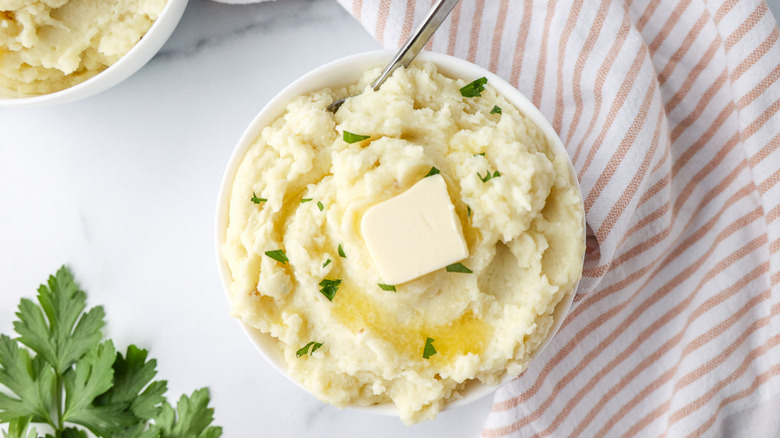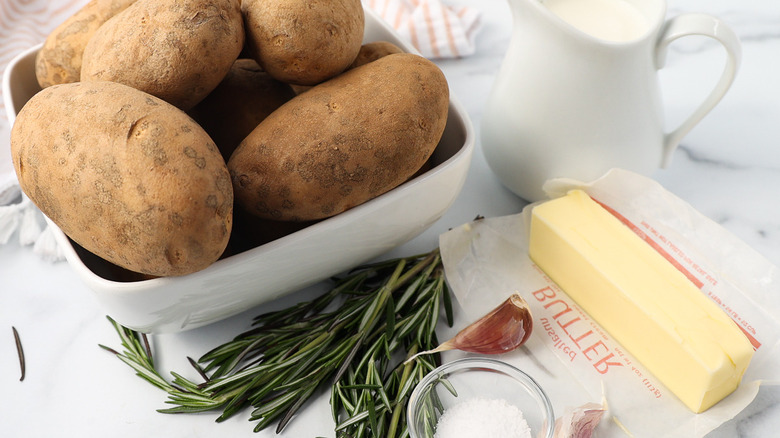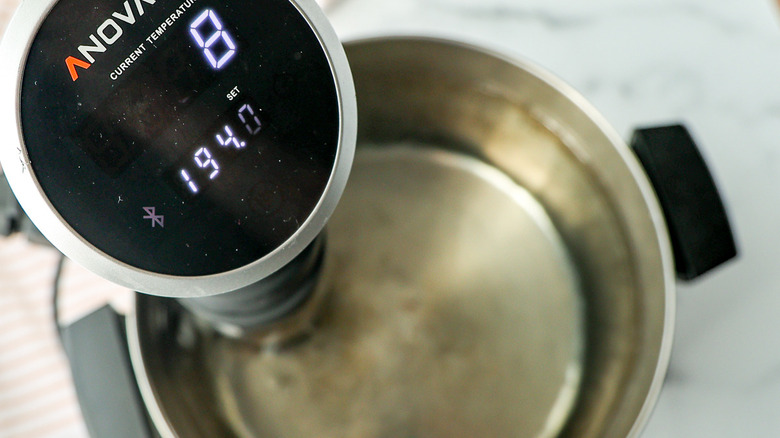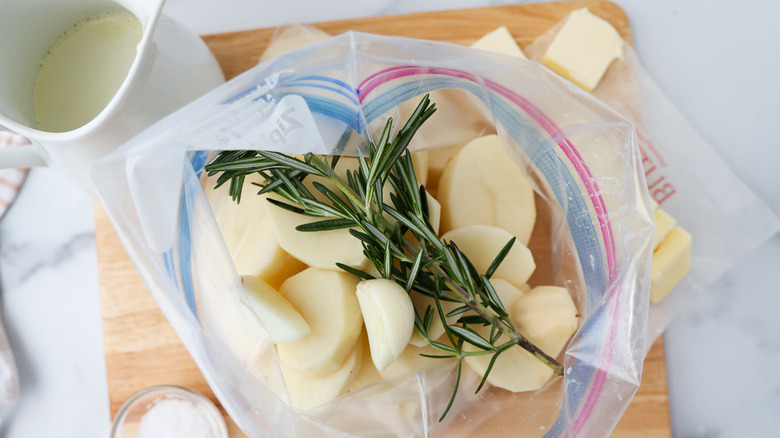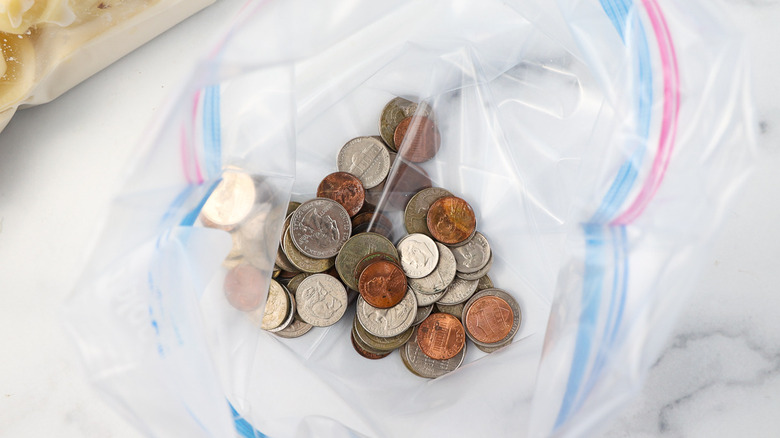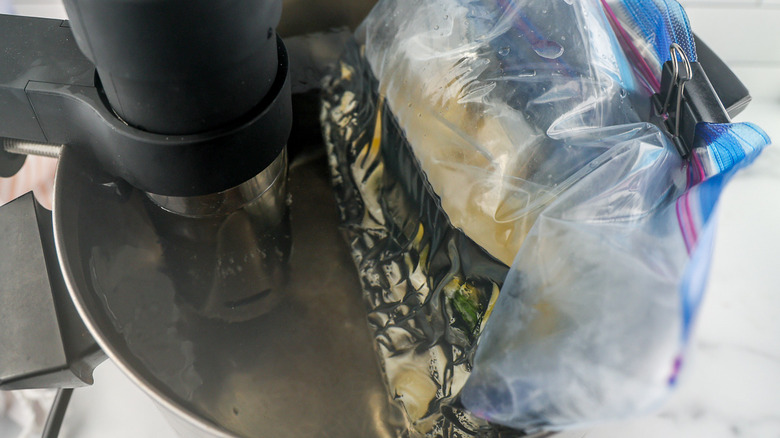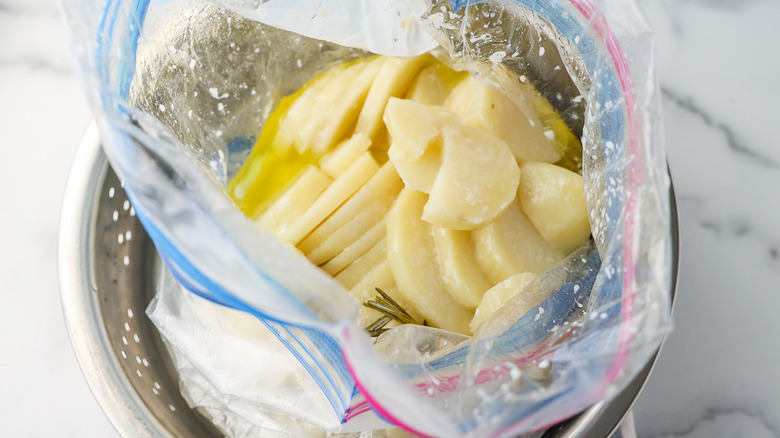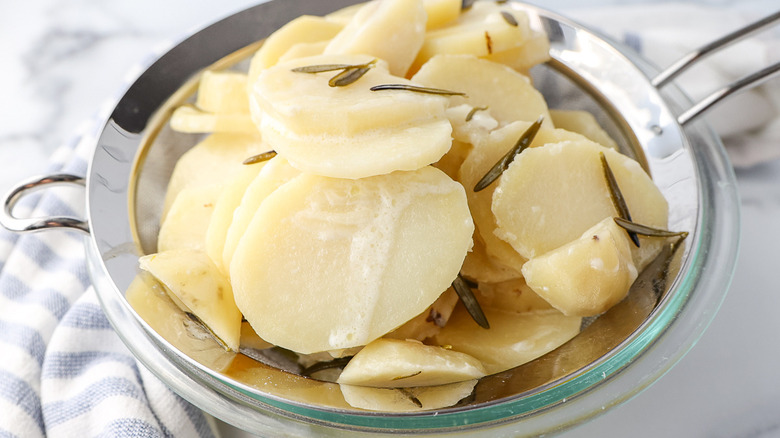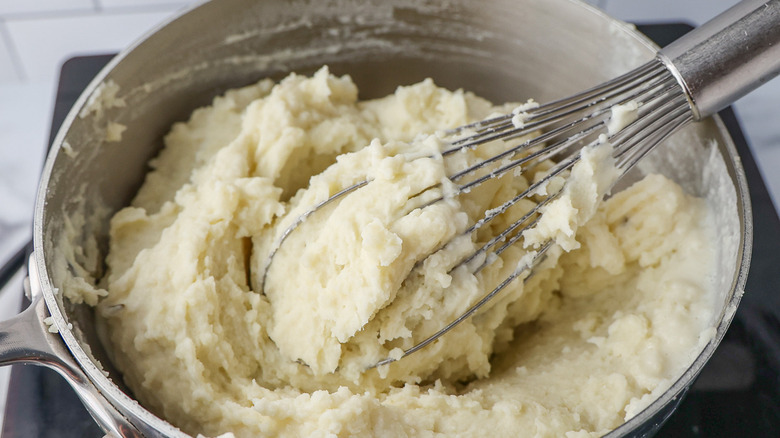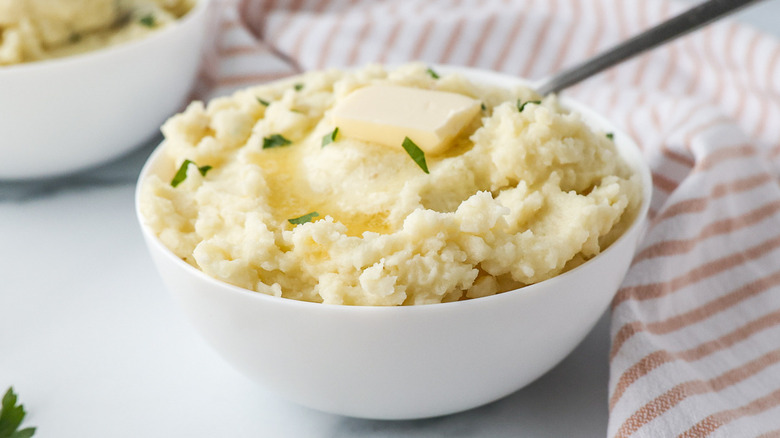Best Sous Vide Mashed Potatoes Recipe
There's nothing like some good old-fashioned mashed potatoes, which have to be one of the best comfort foods out there. While people typically cook mashed potatoes in a pot, there's another way that involves almost no work but still yields that same great result. We'll go out on a limb here and say that these potatoes are even better than your traditional mashed side, and their taste is incredible. This tasty dish uses sous vide instead of a standard pot. If you haven't cooked with a sous vide method yet then let us tell you — you're missing out! What exactly is this method? "Sous vide cooking is about vacuumed sealing the food and cooking it at a precise temperature," food blogger and recipe developer Michelle Morey shares.
You'll want to make sure you have a water circulator to cook with this method. "With traditional boiling, a lot of the flavor is lost in the boiling process," Morey shares of the process. "With sous vide, the potatoes are able to absorb the flavors of the butter, cream, and rosemary, without losing any of the natural potato flavor in the process. So this method makes the dish way more flavorful." The more flavor, the better!
She also raves over the taste of this delightful side. "I love how the nutrients and flavor of the potatoes are not boiled away," she says. "The potatoes are cooked in tons of flavor and really absorb it!"
Keep reading to find out how to make these great potatoes!
Gather the ingredients
The first order of business is to make a grocery list of everything you will need to make this amazing side. For starters, grab some russet potatoes and a few cloves of garlic. Additionally, you will need a few items from the dairy section, including heavy cream and whole milk. The recipe also calls for some unsalted butter and kosher salt. If you cook a lot, you may have one or both items at home already.
To complete your list, add a few sprigs of fresh rosemary. If you can't find it fresh, you can always use dried instead. Once you have everything together, it's time to begin.
Prep the sous vide
The first thing you will want to do is to attach a water circulator to the side of a large pot or heatproof container that can hold 8 quarts or more. "The 8-quart pot needs to be filled with water," Morey shares. "Depending on the size of the pot to cook uses, it should be full about ¾ of the way. So I used about 5 to 6 quarts of water for my pot. There will be a rise in the water level once the circulator and the food are added to the water bath. If needed add more water to the pot to get the bag of potatoes totally submerged." Make sure your pot is on a heatproof surface.
Then, set the circulator to 194 F and press Start to preheat the water. In a smaller saucepan on the stovetop, warm the milk and cream over medium heat for a few minutes, until it starts steaming. Morey shares that with the milk and cream already warmed up, "when all the ingredients are added to the water bath, in their Ziploc bag, it won't take as long for the water bath to come back up to temperature."
Please note that it should only take about 4 to 5 minutes to heat up the milk and cream up — do not let it start boiling.
Slice the potatoes and add to the bag
Now, it's time to grab out your star ingredient — the russet potatoes. Make sure they are peeled and washed, and then slice them. They should be about ¼-inch thick. You'll also want to peel and smash your garlic cloves at this point.
Then, grab a 1-gallon freezer bag and add the sliced potatoes, garlic, cream and milk mixture, butter, and salt. Last but not least, toss in the rosemary. Be sure to press the bag to get out as much air as possible, and then seal it. "Make sure to use good quality FREEZER bags for this task," Morey says. "Cheap bags will bust open during the cooking process."
Grab another bag to weigh it down
Now, take out another 1-gallon freezer bag. You'll want to add pie weights or coins to the bottom to weigh down the bag. This will keep the potato mixture submerged in the process, which is vital for cooking. Then, gently place the potato bag inside the weighted bag and squeeze out as much air as possible.
"Tip for getting the air out of the bag: add [the] bags to the water, but do not submerge completely," Morey recommends. "Open a corner of the freezer bags, and the pressure from the water will press the rest of the air out. Seal tightly and hold bag in place with a clip to the side of your water vessel."
Add the potato bag to the water
Now, it's time to add the double-bagged potatoes to the water bath. Yep, it's like a real bath but for food. Pretty neat if you ask us! Use either a binder clip or a kitchen clip to attach the bag to the side of the cooking pot. You will also want to be sure that the water can circulate behind and around the cooking bag so be sure that there is enough room. This is important for the potatoes to cook properly.
Sous vide is about cooking at a certain temperature and Morey says that the circulator helps regulate the temperature. "If you didn't use a circulator, you'd need to attach a thermometer and constantly adjust the flame or heat of your stovetop to maintain the proper temperature," she shares.
Sous vide the potatoes
Now, you will want to set your timer for 60 to 90 minutes and cook the potatoes until they are tender. Luckily, there is a trick for checking for doneness. Pinch a potato through the bag to see if it's tender. If it crushes easily, then the potatoes are done cooking, and you can remove them. If not, return to the water bath and continue cooking. It could take an additional 20 to 30 minutes.
When the potatoes are done, carefully remove the hot bags from the water bath with tongs. Pull the potato bag out, holding and opening it away from you as the steam can be really hot.
Pull out rosemary and heat saucepan
If you used a sprig of rosemary, you can pull it out of the bag with tongs and then put the potatoes in a strainer. To do this, set the strainer over a bowl to catch the liquid and be sure that you don't discard the liquid you catch in the bowl. Pour the bag into the strainer to catch the potatoes.
Then, place a 2- to 3-quart saucepan on the stove and turn the heat to low. Use a ricer or a food mill to add the hot potatoes to the saucepan.
Whisk the liquid
Now, you can pour in the reserved cooking liquid to the sauce pan and whisk it into the potatoes. This is similar to what you would do when you cook pasta.
Just add a little bit at a time until you reach the desired consistency. Be sure to whisk the mixture as you go. Feel free to taste the potatoes to see if they need any additional flavor. You can add salt and pepper if you feel that the potatoes need it. Feel free to store the extra liquid to use in the future for potatoes, soups, or even chowders.
Serve and enjoy
These potatoes are best when served immediately. They go well with several different main dishes but you can also just enjoy them solo. If you are looking for something to accompany the potatoes, Morey shares some incredible items with which they pair well. "These potatoes are great served as a side along chicken, pork loin, or even a nice braised short rib," Morey suggests. You could even impress your guests by serving them up as a side for Thanksgiving!
We don't think you will have any leftovers, but you can store them in the fridge for five days if you do.
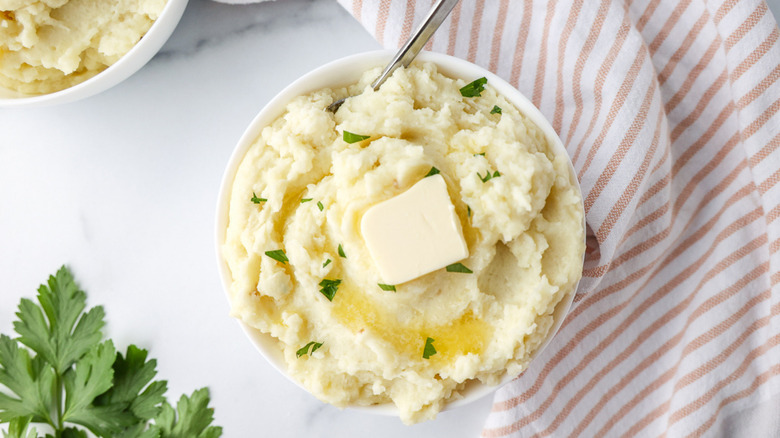
- 1/2 cup whole milk
- 1/2 cup heavy cream
- 2 pounds of russet potatoes, peeled and cleaned
- 2 small cloves of garlic, peeled and smashed
- 1/2 cup unsalted butter
- 1 1/2 teaspoons kosher salt
- 3 sprigs fresh rosemary or 1/2 teaspoon dried rosemary
- fresh chopped parsley, for topping
- butter, for topping
- Attach a water circulator to the side of a large pot or heatproof container 8 quarts or larger.
- Fill the pot ¾ of the way with water and set it down on a heatproof surface. Set the circulator to 194 F and press Start to preheat the water.
- Meanwhile, warm the milk and cream over medium heat in a saucepan on the stovetop until steaming, about 4 to 5 minutes.
- Slice the peeled russet potatoes about to about 1/4-inch thick.
- To a 1-gallon freezer bag, add the sliced potatoes, garlic, cream, milk, butter, salt, and rosemary.
- Press as much air out of the bag as possible and seal.
- In a second 1-gallon freezer bag, add pie weights (or coins) to the bottom to weigh down the bag.
- Gently place the sealed potato bag inside the weighted bag. Squeeze out as much air as possible and seal.
- Add the double bagged potatoes to the water bath. Use a binder clip or kitchen clip to attach the bag to the side of the pot. Make sure the water can circulate behind and all around the cooking bag.
- Sous vide the potatoes for 60 to 90 minutes until tender. If the potatoes are not tender, return to the water bath and continue cooking.
- Once the potatoes are tender, use tongs to carefully remove the hot bags from the water bath. Pull out the bag holding the potatoes and open it away from you.
- Pull out the rosemary stem (if using fresh) and drain the potatoes through a strainer set over a bowl to catch the liquid. Do not discard the potato liquid.
- Place a small 2- to 3-quart saucepan on the stovetop over low heat.
- Using a ricer or a food mill, carefully process the hot potatoes into the saucepan.
- Next, whisk the reserved cooking liquid into the processed potatoes a little at a time until the desired consistency is reached. Taste and add salt and pepper if needed.
- If desired, top with parsley and butter.
- Serve immediately and enjoy!
Nutrition
| Calories per Serving | 204 |
| Total Fat | 14.2 g |
| Saturated Fat | 8.9 g |
| Trans Fat | 0.4 g |
| Cholesterol | 41.9 mg |
| Total Carbohydrates | 17.8 g |
| Dietary Fiber | 1.4 g |
| Total Sugars | 1.5 g |
| Sodium | 297.9 mg |
| Protein | 2.7 g |
